







© All photographs and
text are copyright
Fiona Wase, 2006-2011.
Please do not use
anything from this website without my permission.
Food
1 part Cimicat to 2.5 parts previously boiled water.
Add ¼ teaspoon probiotic (e.g. Avipro)
to 100 ml feed and 0.25 ml of a
multivitamin (e.g. Abidec).
Feed warm, if rabbits have loose droppings
feed Kaogel (0.2mls)
Add ¼ teaspoon probiotic (e.g. Avipro)
to 100 ml feed and 0.25 ml of a
multivitamin (e.g. Abidec).
Feed warm, if rabbits have loose droppings
feed Kaogel (0.2mls)
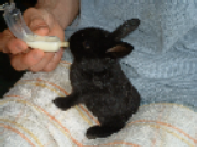
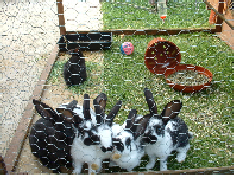
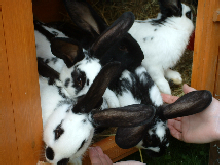
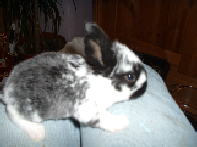
Essentials
Timings
Little and often seems to work best.
Feed every 4 hours to start with (day and night) and as they grow lengthen the gap between feeds. Give as much as they will take.
Feed every 4 hours to start with (day and night) and as they grow lengthen the gap between feeds. Give as much as they will take.
Don’t be fooled; it is a lot of hard work to raise orphaned rabbits, but success makes it very worthwhile.
Weaning
Start weaning at four weeks.
Give lots of hay / readigrass.
Make any changes very slowly - hand reared rabbits are much more susceptible to digestive upsets and can still be lost at 6 to 10 weeks old.
Give lots of hay / readigrass.
Make any changes very slowly - hand reared rabbits are much more susceptible to digestive upsets and can still be lost at 6 to 10 weeks old.
Cleanliness is very important, ensure all syringes, bottles etc are clean before each feed. Use a baby sterilising solution for this. Wash hands before handling in case of carrying any infection to them.
Hand rearing

This is Flecky, one of the hand reared rabbits we kept,
now seven years old!
now seven years old!
Does will only check and feed their litter once or twice a day, so don’t make the mistake of assuming she has abandoned them and start hand rearing just because you don’t see her with the babies.
We only had to hand rear our litter because their mother died when they were nine days old.
We managed to rear seven out of the nine babies which we feel was a real achievement as some people said that none of them would survive.
We managed to rear seven out of the nine babies which we feel was a real achievement as some people said that none of them would survive.
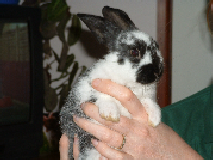
Click to see a video of them aged 3 weeks (not great quality unfortunately)...























